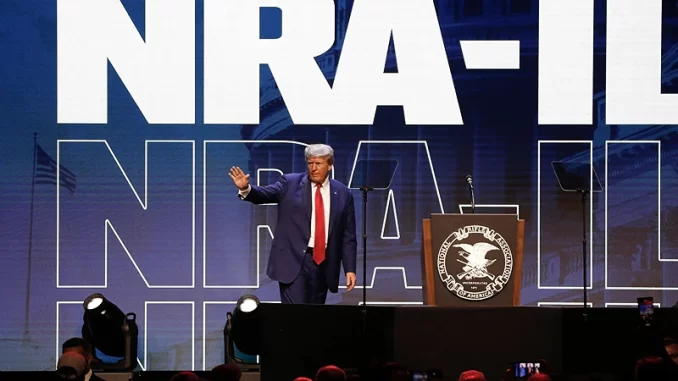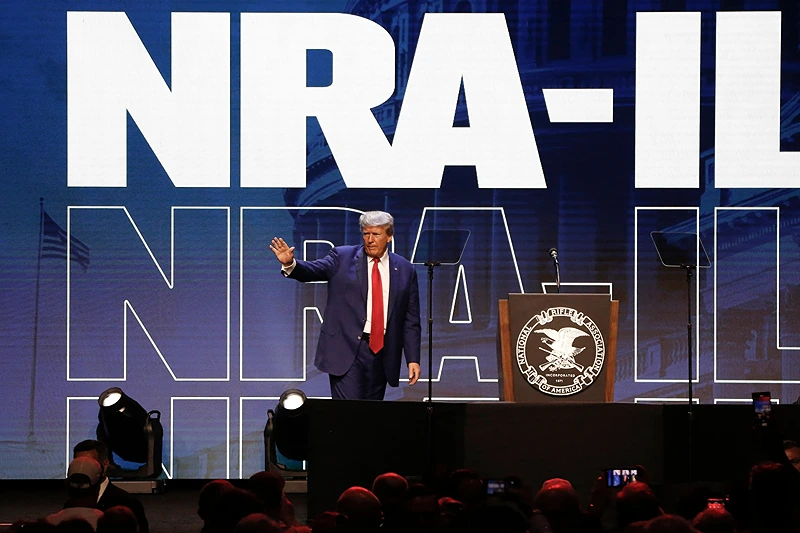

OAN’s Brooke Mallory
11:27 AM – Tuesday, March 19, 2024
The National Rifle Association (NRA) filed a First Amendment appeal with the Supreme Court on Monday. The appeal was directed at a New York financial regulator who had purportedly convinced banks and insurance companies to cut ties with the gun rights organization.
Advertisement
The NRA maintains that Maria Vullo, the former superintendent of the New York State Department of Financial Services, threatened enforcement actions against insurance companies if they worked with or complied with the gun lobby group, in addition to pressuring them to break away from it altogether.
However, Vullo adamantly denies this assertion.
A few judges appeared especially suspicious of a meeting Vullo held in 2018 with Lloyd’s of London, where the NRA alleges Vullo promised not to prosecute any more infractions in exchange for the company’s assistance in the “fight against gun organizations.”
Meanwhile, Vullo claims that her action was directed towards an insurance product that is prohibited in New York: third-party policies offered by the NRA that provide coverage for criminal defense and personal injury expenses that arise from the use of a firearm. The policies were nicknamed “murder insurance” by its left-wing critics.
At one point, conservative Justice Samuel Alito implied that given Vullo’s stance, it would be impossible to “even allege” coercion even if the superintendent had “pulled out a pistol,” held it to the executives’ heads, and urged them to sever ties with the NRA because Vullo could simply claim she was only pursuing unlawful insurance products.
Not only did the conservative members of the court press Vullo with difficult questions. The liberal section of the court also questioned why it seemed that she was working on things other than what was forbidden by New York law.
“What she was seeking was a ban even on potentially lawful programs,” asserted liberal Justice Sonia Sotomayor.
The court’s ruling later this year will determine the extent to which liberal or conservative government authorities can pressure the businesses they oversee to conduct business with organizations that have been deemed contentious by any group or political party.
“The worry is we don’t necessarily want to allow state governments to start using this kind of regulatory force to engage in a kind of third-party pressuring,” said Caroline Fredrickson, a Georgetown Law professor.
She warned of the risk that banks and insurance providers could be pressured by authorities in both blue and red states to stop providing coverage for businesses or advocacy groups that they don’t agree with.
“Government officials are free to speak their minds, but not to wield their authority to pressure others to penalize speech based on its viewpoint,” the NRA stated to the high court.
Vullo was employed in the administration of former Democrat Governor Andrew Cuomo (D-N.Y.). In 2019, she resigned from the position.
While allowing the NRA’s First Amendment arguments against Vullo to proceed, a U.S. district court still rejected several of the organization’s claims. That ruling was overturned by the 2nd U.S. Circuit Court of Appeals, which claimed that Vullo had not used coercion tactics. Additionally, it decided that Vullo was entitled to qualified immunity, a legal theory that, in some situations, protects public servants from litigation.
“Government officials cannot, for example, use their regulatory powers to coerce individuals or entities into refraining from protected speech,” U.S. Circuit Judge Denny Chin wrote. “At the same time, however, government officials have a right – indeed, a duty – to address issues of public concern.”
By the end of June, the Supreme Court is anticipated to render a ruling.
Stay informed! Receive breaking news blasts directly to your inbox for free. Subscribe here. https://www.oann.com/alerts

